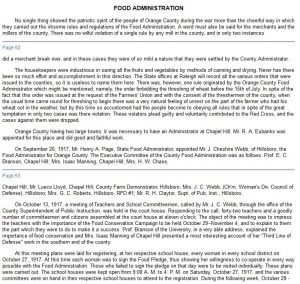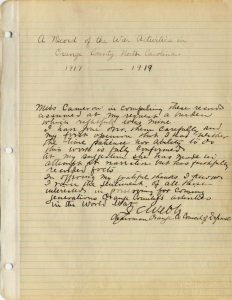
Digital copy of a page detailing the food administrations role in Orange County, NC in regards to the war effort.
I found my media artifacts for this project through searching the website Documenting the American South for the term “food” for my time period 1900 – 1919. I ended up selecting the archived document A Record of the War Activities in Orange County, North Carolina 1917 – 1919. The media artifacts I used from this document for my project were an uploaded original cover page photo and a screenshot of the digitalized text in regards to food conservation in Orange County, North Carolina.
I was very interested in this document because it shows the food story of Chapel Hill at a very contentious time in history. The normal flow of food production and consumption was disrupted in Chapel Hill due to the war effort by both locals and outside actors. An example of this is that that Orange County Food Administrator forbade the threshing of wheat before the 15th of July. The document notes the discontent this caused in the local farming community:
“In spite of the fact that this order was issued at the request of the Farmers’ Union and with the consent of the threshermen of the county, when the usual time came round for threshing to begin there was a very natural feeling of unrest on the part of the farmer who had his wheat out in the weather, but by this time so accustomed had the people become to obeying all rules that in spite of the great temptation in only two cases was there violation.” (52)
In addition to the example of the change in production there where changes in the consumption of food that were strongly encouraged. In Orange County, North Carolina there was a strong push to conserve food through the canning and preservation of fruits and vegetables from local government and outside actors who came and spoke in the community. This campaign was also very gendered which implies to the historian looking back that the head of household maintenance (cooking, cleaning, canning, etc.) was the wife. The food conservation committee registered every woman in every school district at her respective school house to the Food Pledge to reduce waste. If the women didn’t or couldn’t sign at the school house then they were visited individually. Not long after this Food Pledge campaign a systematic canvas was made for each school district and every housewife was interviewed. It is not mentioned in the document specifically what was asked in the interviews but from context I would assume it involved household food consumption and the encouragement to conserve more.
-Brittany Becker
